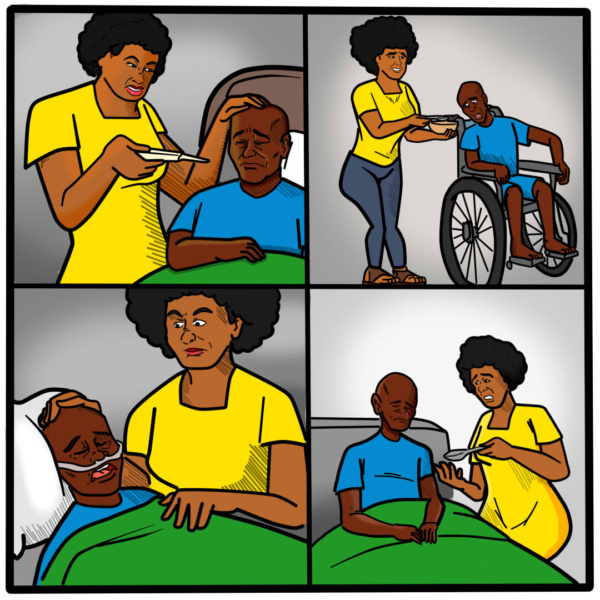By Professor Marilyn Okeke
In the majority of Nigerian marriages, men are older than their wives. On average Nigerian men tend to marry women 11.8 years younger (9.2 years for Christians and 13 years for Muslims) than themselves – according to recent Pew Research Center study on age gap at marriage.
Here’s an uncomfortable truth. Women who marry older men with age difference of about 7 years or more at time of marriage tend to die sooner compared to those who marry men of about the same age. Study** by Sven Drefahl and others found that the greater the age difference from the husband, the lower the wife’s life expectancy. In short, marriage is disadvantageous for women who marry older men.
Conversely, men who marry young women who are 7 years or more younger tend to live longer. The common explanation of this paradox is that later in life, young wives become caregivers to their old and incapacitated husbands. They extend the husband’s life but pay the ultimate sacrifice of dying sooner than if they had married men of about the same age.
It is important to note that the relationship between older husbands and the untimely death of younger wives is complex and there are other factors that may contribute to early death of wives other than caregiving to incapacitated older husbands. Also, the outcome may not apply to all women who marry older men. However, my interviews with dozens of Nigerian women similarly situated seem to support the general proposition.
The best choice for a woman, therefore, is to marry a man of about the same age. Marrying an older husband may shorten her life. Also, if a woman marries a younger husband, she’s likely to die sooner than if she married a man about her age.
This is not fair. The often-recited marriage vows, “Till Death Do Us Part”, doesn’t mean and must not be interpreted to mean, that the younger wife dies caring for the older husband.
This imbalance has to change. In this article I suggest remedies.
If you or someone you know is considering marrying an older man or you’re already marrying an older man, you are well-advised to continue reading.
Let me be clear. Marrying an older man has benefits — he could be more mature and experienced, financially secure, emotionally stable and protective. Also, sometimes, men do care for their sick wives, irrespective of age difference. But in the long run, these benefits seem to fall far too short of the ultimate cost of younger wives dying sooner.
The main cause of death is stress and depression from being the caregiver to a disabled husband. These women die of despair and stress-induced mental and physical atrophy. The stress and anxiety of taking care of an incapacitated husband could add up over time and take a fatal toll on the wife’s health.
Caring for an aging, incapacitated husband with chronic disabilities can often be the most challenging task in a marriage. The majority of Nigerian women I interviewed are confronted with this challenge daily.
For years, researchers suggested that the reason older men live longer when they marry younger wives was an effect called “health selection” — men who select younger women as wives are able to do so because they are healthier and thus already have a higher life expectancy.
But recent studies attribute the extended life expectancy of older men to the caretaker role of younger wives in old age, thereby helping to extend the husband’s life.
This intense caregiver responsibilities tend to have a greater economic and health impact on women. Most women take a leave of absence or work reduced hours with less pay to take care of their disabled husbands.
The toll that caregiving takes is not just financial. Higher levels of depression, anxiety, and other mental health issues are common among Nigerian women who care for their disabled husbands.
Despite the physical and emotional tolls of caregiving and the high health risk for themselves, Nigerian women I interviewed for this article are often left with no one to take care of their own health needs later.
I found that the burden of illness or age-related disability can drain the caregiver, causing her to ignore or overlook her own health in favor of the ill husband at a time when both need assistance the most.
This is not to say that Nigerian men don’t provide long-term care for their sick wives. They do. But these cases are few and far between. The truth is that, with age, more women in general are caregivers to men, despite their own disabilities.
Case Example From My Interviews
Amaka and Okoye have been married for nearly 35 years. At 69 years of age, Okoye has a severe disability caused by a combination of diabetes, obesity and osteoarthritis.
At 60 years old, Amaka’s role has shifted from being a wife into that of a fulltime caregiver. Okoye now requires assistance walking, bathing, grooming, getting cleansed and dressed and even feeding.
Her husband no longer has the cognitive ability to relate to her, and he is physically incapable of engaging in intimacy, leaving her feeling as though she has lost the husband she once knew so well.
“I’ve gone from being a lover to a nurse and a caregiver, which is an entirely different kind of relationship and responsibility”, Amaka lamented in a phone conversation.
Although Okoye is 9 years older than Amaka, Amaka said they had so much in common on so many levels before his illness destabilized their married life.
The once strong, capable husband has become weak and incapacitated, leaving Amaka to care for him in a capacity that she has never known in their decades of living together.
While Amaka loves her husband as much as she did the first time they met, she now finds her new role as caregiver emotionally draining and physically straining, causing anxiety and depression for both of them.
“I couldn’t sleep at night for days. If he moved or screamed during the night, I’d jump up and see if something was wrong… I haven’t had a good night’s sleep for years and I’m also getting older and frailer every day”, she said in a follow-up phone conversation.
On top of all this, some of their friends have abandoned them. Their children are taking care of their own children in different states. Amaka is lonely and deeply depressed.
“Complicating my situation is isolation. Our children are grown and gone. They live in different cities out of state. Our friends don’t come anymore since my husband’s condition worsened. But our children and the pastor call once in a while. What I need and don’t get enough of is physical support. I’m also frail and alone”, she concluded.
Now that Okoye’s health has worsened and his mobility is limited, he’s down in the dumps and tension and anxiety have invaded her marriage and trapped her in a depressive cycle.
Sadly, Okoye died last year, and a few months later, Amaka died of complications from heart failure, according to her older sister. The older sister who is married to a man of about her age is alive and relatively in good health. In an interview, she attributed Amaka’s untimely death to years of suffering from depression and physical and emotional exhaustion as her husband’s sole caregiver.
Amaka’s story is not an isolated case. She is one of many narrated by Nigerian women I interviewed who find themselves caring for husbands suffering from debilitating effects of aging or disease and who no longer can care for themselves.
Today, Nigerian women provide the majority of disability care not only to spouses but also to their parents and parents-in-law.
There’s another salient burden. When the sick husband dies, majority of those interviewed have no clue where things are kept. They don’t know where to find their husband’s bank account and retirement account information. They can’t even unlock his phone and computers. They have no idea where the house and property documents are stored. Worst, they have no clue who is owed money and who is indebted to the husband. They are suddenly confronted with a lot of challenges from day one. And this adds to an already stressful life.
Also, I found that widowed Nigerian women often have limited opportunities, if at all, to find another companion at their age. Even when they find another man, he would be older, and most likely to need caregiving soon. The cycle repeats, unfortunately.
What Spouses Must Do Today
Some have suggested that women need to stop marrying older men, and in fact should go for younger ones. They argue that by marrying older men, women set themselves up for years as the suffering caregiver and eventually clueless widow.
I believe there are other remedies couples should consider.
A serious illness or aging issues should not rock the foundation of your marriage. A strong couple must find a way to hold together despite the burden of caring for each other in disability.
I suggest you do these:
- Have an honest discussion about what is expected should the day come when one spouse must care for another as a caregiver.
- Develop a plan on what will be needed to ensure that the burden of care is not too much for one person to bear.
- Create a list of important financial and legal documents, online and electronic device passwords, user IDs and passcodes and where to find them so that it is easy for your spouse to locate in case of incapacitation.
- Seek advice on how to cope with both the change in health and with the actual process of caregiving. There are several outlets in Nigeria to get information.
- If one spouse is already in disability, the caregiver spouse must treat the other with human dignity and respect.
- Ask for help from family. Involve other family members early in the process. A shared burden lessens the weight on the caregiver.
- Don’t give up friends or activities while caregiving. It is important to maintain social contacts and keep living the much you can.
Need For Support For Nigerian Women Caregivers
- Government at the local level should provide support services to help women caregivers remain healthy, improve their caregiving skills and remain in their caregiving role.
- Caregivers should be paid by the employers when they take leave of absence to care for disabled husbands.
**It is likely that the results obtained in this study may not generalize in every situation outside the study population. However, on a qualitative level, there are important connections between elements of the study and the recurring experiences of Nigerian women I interviewed for this article. Given that the key determinant is age gap at marriage, it is likely that similar studies will produce the same results in different circumstances. More research is needed in Nigeria.



